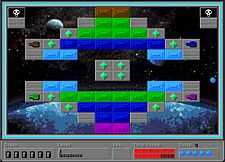Diamonds (video game)
| Diamonds | |
|---|---|
 Screenshot of the first level, titled Simpleton. | |
| Developer(s) | Dub Myers and Oliver Dreer |
| Publisher(s) | Varcon Systems, Inc. |
| Platform(s) | Macintosh |
| Release date(s) | 1992 |
| Genre(s) | Arcade Game, Puzzle Game |
| Mode(s) | Single Player |
Diamonds is an arcade-style game released for the Macintosh in 1992 by Varcon Systems, Inc.
Gameplay
The goal of Diamonds is to achieve a high score while completing as many levels as possible before running out of lives, or ultimately to complete the last level of the game.

During the game there is a small ball constantly bouncing up and down on the screen, similar to Breakout. However, unlike the paddle in Breakout, the player can directly control the left and right motion of the ball using the arrow keys on the keyboard. In fact, this is the only control the player has over the game.
To complete a level, all blocks with diamond symbols must be cleared away by bouncing the ball against them. However, before the diamond blocks can be destroyed, all solid color blocks must be removed by bouncing the ball off each block while the ball matches the color of the particular block. Among the various types of blocks are "brush" blocks, which alter the color of the bouncing ball when it makes contact with them, and skull blocks which cost the player one life.
When beginning a level or after losing a life, the ball is initially light blue. The player needs to then eliminate all light blue blocks first because there are no light blue brushes to return the ball to that color. Therefore, if the ball's color is changed while light blue blocks remain, the only way to change the ball back to light blue is to intentionally lose a life.

Ports
In 1993 a port was written for the Apple IIGS by Richard Bennett and Sean Craig, however sat in limbo due to licensing issues with Varcon Systems. After much delay and failure to have it licensed, it was unofficially released as freeware in 1996.
Sequels
Varcon Systems, Inc. licensed MacSoft Games to release Diamonds and More Diamonds in 1994. The significant change to this new version was the addition of forty new levels after the original thirty. MacSoft also produced a three-dimensional edition of the game, Diamonds 3D, in 1995.
Several years afterwards, a pseudo-sequel entitled Diamonds for Kids which featured overall lower difficulty than its predecessor and slight graphical adjustments to accompany a smaller play field was released as part of the compilation disc "Kid's Arcade Pack" produced by Wizard Works.
References
External links
- http://diamonds.sourceforge.net/ An open source project dedicated to porting Diamonds to PC.
- 16-bit Windows version of Diamonds and More Diamonds that will work in 32-bit versions of Windows, and will not run in 64-bit versions of Windows